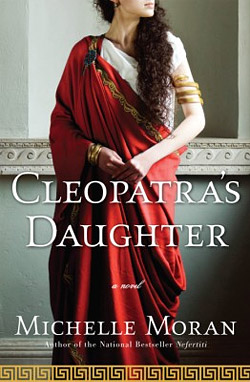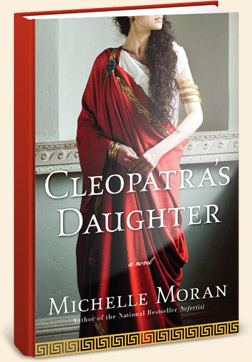
Reading Group Guide for Cleopatra’s Daughter
- At what age did ancient Romans reach adulthood? What type of impact did officially becoming an adult have on any of the characters in the book?
- What reasons, if any, did the characters in the book have to either look forward to becoming adults or to dread making the transition from childhood to adulthood? Do young people living today have reasons to feel the same? Why or why not?
- Are there elements of the ancient Roman world that seem similar to life today?
- In the beginning of the novel, Octavian comes across as a ruthless man willing to do whatever it takes to stay in power. What examples can you give of his ruthlessness?
- How did you feel about Octavian in the end? Had your feelings changed? Why do you think he treats Selene as he does at the end of the novel?
- Several of the young male characters in the book seem to either yearn for or to be pushed by members of their family toward a quest for power. What impact did this quest have on their lives and their relationships with others?
- Octavian/Augustus governed Rome for decades; sometimes with guile, often with ruthless force that included assassination and collective punishment. Do you think he ruled this way out of a desire to improve life for all Romans or to protect himself and his own power? Is the desire to bring and maintain order and stability in a country justification for ruling in this manner? What boundaries, if any, should rulers never cross?
- Selene has two romantic interests in the novel. which, if either, is based in fact (about what the other person is really like) and which on conjecture and fantasy? How does her attitude and character change as she matures and passes from one romance to the other?
- Despite a common love interest, Selene and Julia have very different personalities and a complex relationship with each other. Do you think their feelings toward each other change during the course of the novel? If so, how and why?
- Once conquered by Rome, countries found themselves subject to Rome’s system of law, administration, learning and empire. Ultimately, do you think this represented a gain or a loss to the citizens of these countries and their cultures?
- How did Selene’s interests and desire for knowledge and education vary from those of Julia and other young women in the novel? What impact, if any, did these interests ultimately have on Selene’s quality of life and how others came to value and perceive her? Pursuing these interests took up a great deal of her time and effort. What, if anything, did she lose as a result of taking this time and effort? What did she gain?
- Octavia showed tremendous compassion for the adopted children placed in her care, even though they were fathered by her husband, Marc Antony, when he was still married to her. How would you have responded to such a betrayal? Who would you have held responsible for that betrayal? What, if anything, do you think Octavia received in return for her kindness?
- The slave trials described in the novel were real examples of Roman collective punishment. How does the administration of justice in classical times differ from the modern ones we know today?





